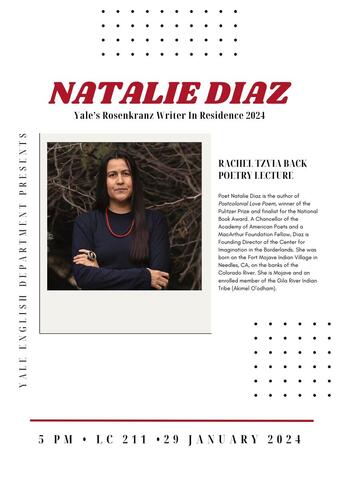Pulitzer Prize-Winning Poet and Writer-in-Residence Natalie Diaz Offers Campus Reading

January 29th, Natalie Diaz, Yale’s Rosenkranz Writer in Residence 2024, read some of her work as part of the Rachel Tzvia Back Reading Series. She is the author of Postcolonial Love Poem (2020), which won the Pulitzer Prize and was a finalist for the National Book Award. She is the recipient of numerous prestigious fellowships and is the Founding Director of the Center for Imagination in the Borderlands.
Diaz is Mojave and an enrolled member of the Gila River Indian Community (Akimel O’odham). Her reading Monday evening included poems “Postcolonial Love Poem,” “I Watch Her Eat the Apple,” and “Alchemy Horse.”
At Yale, she is teaching “Breathing Poetry into the Archives,” a seminar for students with a range of experience in creative writing. During the reading, Diaz described that the course takes students “through, into, toward, and against the Archives” with poetry and language.
Ethan Estrada, an undergraduate in Diaz’s seminar who studies Ethnicity, Race, and Migration, said that the course readings “have presented diverse approaches to artistic, poetic, and archival practice.” They said Diaz is an excellent facilitator and that “class discussions seem attentive to our personhood” while also being rigorous academic experiences.
Estrada read Diaz’s poetry while they were in high school four years ago and describes feeling “so seen by it, so recognized, and so transformed” by Diaz’s words. They, alongside many other undergraduate and graduate students, faculty, and community members sat quietly while Diaz read.
Sandra Sánchez, a 6th-year PhD candidate, shared that they were enamored with Diaz’s performance. “The emotions, the rhythm, and flow of her reading caught me off guard in its impact on the audience and myself. It was extraordinary, really.”
Assistant Professor of Ethnicity, Race, and Migration Tarren Andrews also found Diaz’s reading intriguing. “I really loved Diaz’s reading; it felt like an extension of the classroom that brought us all in and opened up a highly coveted space to be with her as a teacher and a poet.”
Natalie Diaz’s poetry asserts Indigenous presence–and resistance. Sánchez notes the growing attention to Native voices at Yale. “More and more it seems, people are paying attention to the work of Native writers, scholars, artists, poets, playwrights, and so much more.”
Both Sánchez and Andrews see Diaz’s presence as a hopeful moment, reflecting the expansiveness and impact of a growing emphasis on Indigenous Studies at Yale. Sánchez hopes the community welcomes Diaz with the same care she took in her reading, opening ears to the meaning of language and what it means to ‘understand.’
At the end of the reading and Q/A period, Richard Deming, Director of Creative Writing at Yale, called for an encore, an uncommon occurrence at poetry readings. The audience applauded in agreement, and Diaz read her final poem of the evening.
Estrada said that poetry that we love, like Natalie Diaz’s, grows with us–whether our first encounter was this year or many ago. “The best poems become companions that offer new insights, new clues to, and new illuminations of the path forward.”
On February 12th from 5:00 to 7:00pm. La Casa and the Native American Cultural Center will be hosting a welcome dinner for Natalie Diaz with a catered dinner at the NACC and dessert to follow at La Casa. Registration can be found through Yale Connect.
Diaz is a Chancellor of the Academy of American Poets and a MacArthur Foundation Fellow.